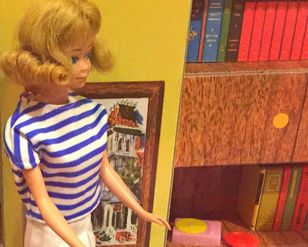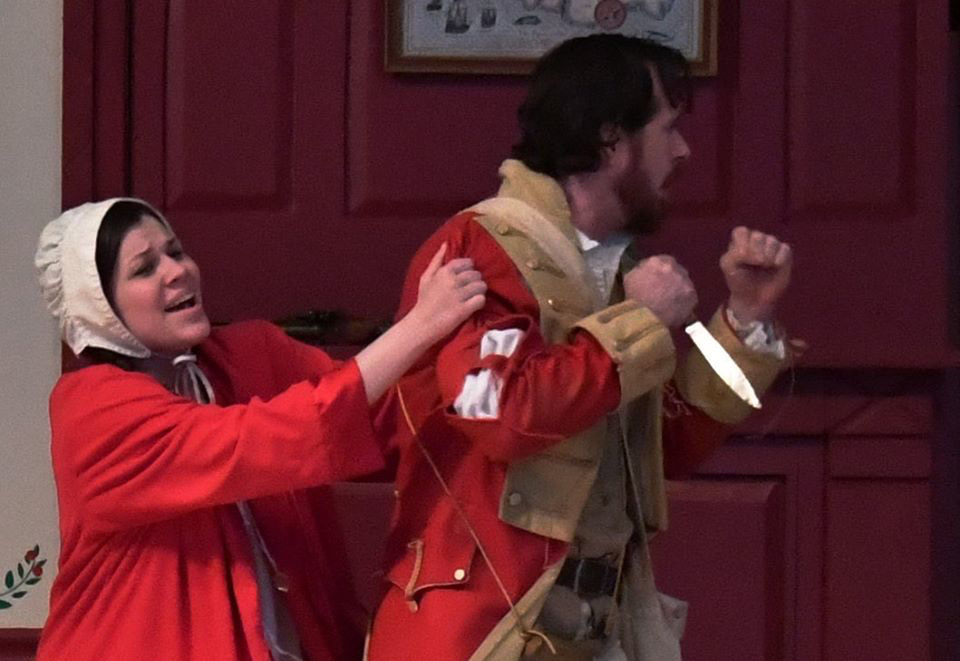 MEG'S IN LOVE... AGAIN! MEG'S IN LOVE... AGAIN! , When my friend’s mother overheard me telling her daughter what to do, she went to my mother and complained I was being bossy. But my mother understood, bless her. I was just doing my job. My friend had asked me to create stories for our Barbie dolls. In fact, all my friends asked me to do create stories for them. And I was in demand... I would create sets and plot lines, and we'd act out scenes for eight hours at a time. I was dead serious about character development, too - which is not easy when your actors are plastic. And I took it as a personal challenge to get my friends to like their Meg dolls as much as their Barbies and Kens. My solution? Create a fabulous story line just for Meg. Uh, oh. A guy doll for Meg? No problem! I grabbed my brother's G.I. Joe. Yes, yes, he was shorter than Meg, but G.I. Joe had way better pecs than Ken. Also had another skill that made me the hit of the neighborhood: I was the only one who could do guy voices for the male dolls. Quite a skill for a five-year old. Fast forward to my excruciatingly boring years at an all-girl Catholic elementary school. While there, my best friend and I created what we called, "The Story”. Used mostly as a device to daydream about boys, she and I would trade off telling "The Story” - an uncomplicated tale of two fabulously well-dressed, jet-setting female spies who traveled the world on the arms of their James Bondian boyfriends. One day I stopped the story line to pass it off to her to continue – as we always had - but instead, she said, "No, Meredith. You keep telling it. You're the real story teller." That was an important day. My big break came when our school offered our 4th grade class a chance to produce its own talent show. I immediately sat down and wrote a play, cast my fellow classmates, directed my friends through rehearsals, and brought it to the stage. But it was a disaster…. and it was all my fault. Classic rookie error: I’d cast myself in the lead role. Figuring I’d written the lines, I was certain I’d remember them. Yeah. No. From that I learned I had a lot to learn. But I also learned that I really, really liked directing human beings. They had their own voices, could make their own character choices, and the bendable arms and legs were a definite plus. As I grew older, I developed another passion: history. Figuring that major would give me a better chance at a normal income, I chose a BA in History and a minor in English at William and Mary. After graduation, I began work at a small museum that was once a tavern. When the staff was asked to create public programming, naturally I wrote a play about tavern life and asked my college friends to join me. Best casting decision I ever made was asking a tall redhead named Chuck McMath to play the Stage Coach Driver. He said yes. And a year later, I said yes. Did I mention I'm really good at casting? When Chuck and I moved to Loudoun County, Virginia, I began creating living history programs for area museums, schools and libraries. Through our son’s preschool class, I met Laurie Farnsworth - the most amazing seamstress I've ever had the pleasure to know. Laurie and her friend, Dolly Stevens, had just formed a theatre company: The Growing Stage. Would I like to help with costuming? Indeed I would. While working with The Growing Stage, I spent a lot of time observing Dolly's brilliant directing techniques. Then Dolly hired Tom Sweitzer out of Shenandoah Conservatory to direct one of her shows, and I watched Tom's brilliant directing process. Then Tim Jon — a Loudoun County Radio DJ who'd spent eighteen years of his life as a professional actor — started producing Shakespeare in the area, and I watched his brilliant process. I appreciated every minute of these unofficial internships. Each director was unique: each was generous with their time and talents, and each changed the lives of everyone with whom they worked. In the meantime, I'd continued to write plays. There was one play I was particularly pleased with: it was based on true stories from the pages of Loudoun County, Virginia Civil War women's history. Had no idea what would happen to it, but I knew it was time to try it on the stage… as long as I stayed out of the cast.  ALL FOR THE UNION by Meredith Bean McMath (2011 Production) ALL FOR THE UNION by Meredith Bean McMath (2011 Production) +Dolly Stevens took a chance on me and decided to produce and direct my Civil War play, All for the Union (first known as The Waterford Girls). Dolly had been the first Musical Theatre graduate from Shenandoah Conservatory and the instructor of my first adult acting class. From Dolly I learned things about commanding stage space, effective blocking, and a whole goodie bag of acting techniques. For instance, one day during rehearsals for my play, Dolly watched a young actress keep crying during an emotional monologue. She stopped her and said, "Listen. If you cry, the audience doesn't have to and they won't. But if you almost cry, the audience will cry for you, and then you have them." Dolly was dead right, and I've used that technique ever since. Then there's Tom Sweitzer - another theatre force. From watching Tom, I learned important things, like how to layer and build rehearsals — how to take into account where each actor is in the development of their character and how to give them one step at a time to work on (instead of asking for everything at once). Tom had been writing the music for a musical based on his childhood in Altoona, PA, and I was thrilled when he asked me write the book using his concept and outline. When we began rehearsal for that musical, Porches, I remember speaking to him about a particular actor, asking him why he wasn't pushing this person more. Tom said, "He's not ready. I'll bring that to him when he's ready." And he was spot on. That blew me away. And from Tim Jon I learned how to approach Shakespearean text. I have a thing for the Bard — been in love with his work since 5th grade, when my best friends and I acted out the scene with Juliet, Lady Capulet and Nurse. I was Nurse. Our teacher, Mrs. Romito, taught us how to interpret the text, and endeared her to us forever by explaining all the dirty jokes. Years later I learned Mrs. Romito had been a professional actor. Did not surprise me at all, and I am so thankful she took the time to share her talents with us. Via Tim Jon’s company, Not Just Shakespeare, I learned a professional actor's approach to Shakespearean text... and several more of the Bard's dirty jokes. From Tim I also learned actor preparation and the efficacy of improvisation. Tim has a deep respect for an actor's process, and he excels in teaching actors how to build three-dimensional characters. His use of improv has encouraged me to experiment over the years, and that's been a gift. Around that same time, I was taking Master Improv Classes with Tom Sweitzer, and together, these two have had a huge influence on how I use improvisation while directing. For instance, when actors over-focus on remembering their lines or stage movement, improv is a great way to shake them loose. When I was directing my play, Arms and the Highlander*, we were working through the first scene in which a young woman meets and begins to fall in love with a British soldier. Colonial American soldiers (Minutemen) were looking for him. When they came knocking at the young woman's door, the British soldier pulls out a knife and prepares to defend himself. The young woman pushes him behind a door to hide him and lets in the searching soldiers. Well, it was crucial the actress caught the intense feeling of the moment, because the audience was only going to be able to see her face - and it had to show her attempt to hide her fear. But there was no tension in the room at all. So I stopped rehearsal and asked the British soldier and the Minutemen to act out exactly what would happen if the soldiers found him hiding there. Okay. It's a fake knife (collapsible), but they got into a serious brawl that ended when a Minuteman disconnected that British soldier's thoughts from his actions. She played the tension from there on out. She was brilliant, in fact, and the scene began to glow. Improv saved the day once more. Another huge influence has been the actors themselves. When you have a talented actor, there are times you just stand back in awe... and learn as much as you can from them. Without question, the actor who's influenced me most was my own mother... that beautiful woman who happily defended me from my friend's mother when I was five years old. Maxine Bean was an amazing actor - a child radio star in St. Louis, Missouri, and the star of many college productions at Grinnell College in Iowa. After my father passed away, she came to live with us in Loudoun County and worked with me in area theatre: favorite roles include the "School Marm" in Dolly and Tom's musical, TREASURES: The Musical Adventures of Tom Sawyer, and the starring role as "Miss Violet" in Tom's and my musical PORCHES. She was incredibly generous on stage. This is a little hard to describe, but every actor who worked with her knows exactly what I mean. She gave an added connection to the actors on stage and gained both the actors' full attention and the audiences' admiration. She was deeply serious about the craft. One of Miss Violet's lines always got a huge laugh. Always. But one night, the actor who played her sister suddenly stole the line, so she got the laugh. Maxine didn't lose a beat on stage, but when she got backstage, she looked the actress dead in the eye and growled, "NEVER do that again"... and she never did.
For me, directing has always been a heady mix of my passion for storytelling and the constant pursuit of learning - learning how to be a better writer, a more helpful director, a more creative producer... I never stop learning. And I’ve appreciated every director with whom I’ve worked, every class taken, every rehearsal attended, and every actor and crew member’s efforts. And I remain particularly grateful to all my friends from the old neighborhood who asked me to boss them around. * Arms and the Highlander is my Colonial adaptation of George Bernard Shaw's Arms and the Man.
3 Comments
Pat Roles
7/27/2023 01:43:01 pm
Meredith, this essay is fascinating! I am so glad that you were able to follow your dreams.
Reply
Meredith McMath
7/27/2023 02:35:35 pm
Thank you so much!
Reply
Leave a Reply. |
